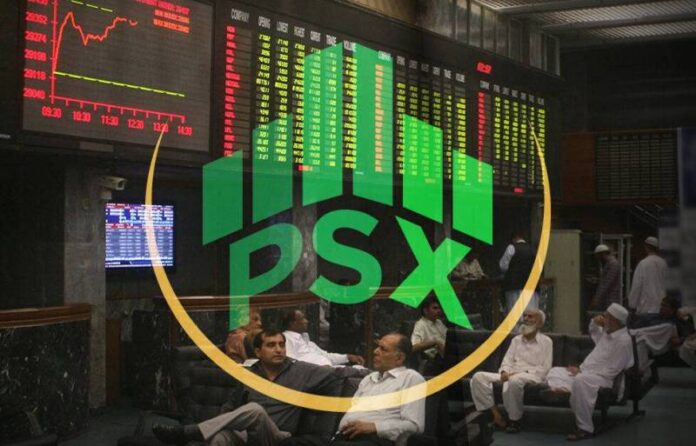The Pakistan Stock Exchange (PSX) plunged into chaos on Monday as panic gripped investors, with the benchmark KSE-100 Index crashing over 4,000 points during the intraday trade, driven by escalating cross-border situation with Afghanistan and mounting uncertainty over delays in finalising Pakistan’s staff-level agreement with the International Monetary Fund (IMF).
According to the PSX website, the benchmark index plunged 3,040.24 points or 1.82% to 160,057.95 as of 9:30 am, as investors reacted to rising geopolitical tensions. Selling pressure was seen in automobile, oil and gas, cement, banking, fertiliser and power generation stocks, with index-heavy shares including HUBCO, MARI, OGDC, PPL, POL, HBL, and UBL all in the red.
At 12:00 pm, the KSE-100 was hovering at 159,276.67, down by 3821.52 points, or 2.34% from the previous close of 163,098.19 points.
Market experts attributed the downtrend and selling pressure to developments over the weekend, including geopolitical concerns and cross-border tensions with Afghanistan. They also noted that global equity markets were experiencing similar strain.
The market decline followed reports that at least 23 Pakistani soldiers were martyred and more than 200 militants killed in overnight clashes along the Pakistan-Afghanistan border, after an attack launched from Afghan territory, according to the Inter-Services Public Relations (ISPR).
The latest tensions come as the PSX was already showing signs of weakness, with the KSE-100 index falling 3.5% last week to close at 163,098.19 points amid reduced volumes and profit-taking following a prolonged rally.
On the global front, Asian stocks got off to a rocky start on Monday after fresh broadsides in the U.S.-China trade war spooked markets with already stretched valuations, though there were signs risk sentiment had steadied with Wall Street futures bouncing. A holiday in Japan and the United States made for choppy early trading and political uncertainty still shrouded Japanese and European assets.
The Nikkei was closed on Monday. Futures were trading up 1.3% at 46,690 but that was still far below the cash close of 48,088.
Shares in South Korea slid 2.1%, while Australia lost 0.5%. MSCI’s broadest index of Asia-Pacific shares outside Japan dropped 0.6%.
Wall Street was trying to make a comeback with S&P 500 futures rallying 1.1%, while Nasdaq futures jumped 1.6%.
EUROSTOXX 50 futures edged up 0.2%, while DAX futures firmed 0.4% and FTSE futures were flat.
Currency markets saw some stabilisation after Friday’s rush into the traditional safe havens of the Japanese yen and Swiss franc. The dollar gained 0.5% to 151.98 yen , having slid 1.2% on Friday from a top of 153.29.
The euro was flat at $1.1607, while the dollar nudged up 0.2% on the Swiss franc to 0.8010. The dollar index was steady at 99.015, after losing 0.6% on Friday.
In bond markets, cash Treasuries were closed for a holiday, but futures slipped 5 ticks as sentiment steadied.
Yields had hit multi-week lows in the wake of Trump’s tariff threat, while investors had added to wagers on more rate cuts from the Federal Reserve.
In commodity markets, gold remained in high demand as a hedge against fiscal and political uncertainty, rising 0.5% to $4,037 an ounce and pipping last week’s record to touch $4,059.
Oil prices also regained some ground on hopes the U.S. and China would find some compromise on trade to avoid fresh tariffs. Brent bounced 1.0% to $63.36 a barrel, while U.S. crude rose 1.0% to $59.45 per barrel.
























